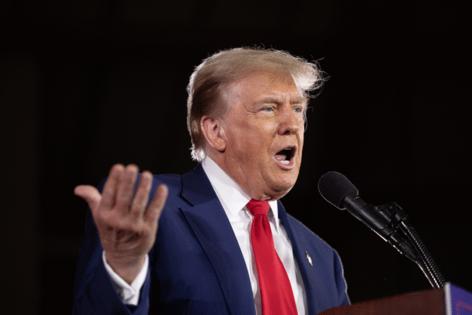Commentary: Will justices compromise their conservative cred for Trump?
Published in Op Eds
On April 25, former President Donald Trump argued to the United States Supreme Court that the Constitution crowned him absolute immunity from criminal prosecution for acts taken during his presidency. The facially alarming argument made startling headway with conservative Justices Clarence Thomas, Samuel Alito, Neil Gorsuch, Brett Kavanaugh and Amy Coney Barrett.
They characteristically tout canons of constitutional interpretation that would slay Mr. Trump’s immunity argument without breaking a sweat: textualism, originalism, deference to constitutional assumptions of the political branches and history. All four, singly or collectively, are fatal to the idea that presidential crimes — ranging from treason, bribery and insurrection to assassinations, torture and kidnapping — are shielded from prosecution.
Start with textualism. Not a word in the Constitution suggests presidential immunity. Search Article II, which addresses executive power. It obligates the president, among other things, to faithfully execute the laws, which implies a prohibition on flouting the laws.
Further, the text of Article I, section 6, confers immunity on members of Congress from prosecution for actions taken in their legislative capacities. The absence of corresponding text in Article 2 is compelling evidence that no immunity exists for the president. Article 3, which addresses judicial power, likewise is naked of text immunizing federal judges, including Supreme Court justices, from criminal prosecution. Federal judges Otto Kerner, Alcee Hastings and Martin T. Manion were indicted or prosecuted during or after holding judicial office.
Originalism also defeats Trump’s criminal immunity claim. Thomas Paine, voice of the American Revolution, wrote in “Common Sense”: “For as in absolute governments the King is law, so in free countries the law ought to be King and there ought to be no other.” Indeed, the American colonies revolted against the British Empire doctrine that the King can do no wrong. No member of the constitutional convention, no member of state ratifying convention, and no commentary surrounding ratification of the Constitution hinted at presidential immunity from criminal prosecution. If that idea had surfaced, it would have been the death knell to ratification.
History also speaks volumes against immunity. Mr. Trump is the first former president in 235 years to argue for immunity. Former President Richard M. Nixon confronted the prospect of prosecution for obstruction of justice or related Watergate crimes by special prosecutor Leon Jaworski until President Gerald Ford issued a blanket pardon. Mr. Nixon’s acceptance of the pardon tacitly acknowledged guilt.
With just hours left in office, President William Jefferson Clinton concluded a deal with the independent counsel Robert Ray to avoid indictment for his misleading statements about Monica S. Lewinsky. In exchange, Clinton made a forthright admission that he gave false testimony under oath.
The longstanding view of the U.S. Justice Department also militates against criminal justice immunity for former presidents. In 1973 and in 2000, the Department’s Office of Legal Counsel (OLC) opined against immunity. The latter asserted, among other things, “Recognizing an immunity from prosecution for a sitting President would not preclude such a prosecution once a President’s term is over or he is otherwise removed from office by resignation or impeachment.” OLC opinions command special respect in regard to executive power because its mission is to strengthen the constitutional hand of the president. I know. I served as special assistant to the assistant attorney general for OLC during the Nixon administration.
An indeterminate number of senators voted against impeaching Trump at his second impeachment trial on the assumption that he could be prosecuted for crimes he committed as president. Sen. Mitch McConnell, the Kentucky Republican, for instance, explained his vote for acquittal as follows: “We have a criminal justice system in this country. We have civil litigation. And former presidents are not immune from being held accountable by either one.”
During oral argument last week, Chief Justice John Roberts and Associate Justices Alito, Gorsuch, and Kavanagh worried about “political” prosecutions of former presidents because grand juries can easily be persuaded to indict the proverbial “ham sandwich.” But such a hypothetical case has not surfaced in 235 years. And Justice Samuel Miller underscored in United States v. Lee (1882), “Hypothetical cases of great evils may be suggested by a particularly fruitful imagination in regard to almost any law upon which depends the rights of the individual or of the government, and if the existence of laws is to depend upon their capacity to withstand such criticism, the whole fabric of the law must fail.”
Finally, the court itself has compounded the potential for prosecutorial abuse that confronts all defendants, not only former presidents. It has cloaked prosecutors with absolute immunity for constitutional violations and authorized them to re-indict an accused on more serious charges if a guilty plea is not entered to a lesser offense.
The conservative justices can sustain Mr. Trump’s immunity argument in whole or in part only by abandoning their conservative interpretive principles in favor of a desired result. Their conservative credentials would be tarnished.
____
Bruce Fein was associate deputy attorney general under President Ronald Reagan and is author of “Constitutional Peril: The Life and Death Struggle for Our Constitution and Democracy.”
___
©2024 The Baltimore Sun. Visit at baltimoresun.com. Distributed by Tribune Content Agency, LLC.







Comments